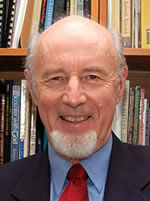Lesslie Newbigin says, “Money, which is a useful means for facilitating exchange, has become a power in itself, so that we do not measure human wealth in terms of goodness and happiness but in terms of cash. Money has become a fetish, a power which demands and receives absolute devotion.” The “powers” in Scripture are structures of reality created by Christ and for Christ for our good. They range from structures like economies and governments to invisible spiritual beings like angels and demons. We live in an ordered universe, a cosmos not a chaos. These powers were originally good (Col 1:16) but they taken on a life of their own and demand loyalty. That is what the word “Mammon” means. When Jesus said, “You cannot serve God and Mammon” (Lk 16:13), he is referring to the presumed claim money makes to give security. In Aramaic “Mammon” comes from the same root as “Amen.” It means firmness and stability. So money is not neutral. Richard Foster points out that "Money has many of the characteristics of deity. It gives us security, can induce guilt, gives us freedom, gives us power and seems to be omnipresent." It can enslave us. Money can enable replacing neighbour relationships with buying-selling relationships in which even the soul can be bought (Rev 18:11-13). Not surprisingly, in the Western world we speak of "The Almighty Dollar."
A Jewish reflection from the Gates of Prayer, Reformed Jewish Prayerbook, Salkin, Being God’s Partner, 145 is apt:
The gods we worship write their names on our faces, be sure of that….We may think that our tribute is paid in secret in the dark recesses of the heart—but it will [come] out. That which dominates our imagination and our thoughts will determine our life and character. Therefore it behooves us to be careful what we are worshipping, for what we are worshipping, we are becoming.
But there is more to money than the potential for worship.
Money can do things to us negatively:
Wealth often leads to desensitization towards the suffering and affliction of others (Amos 6:6). The love of it, as the professor in Ecclesiastes notes, means that “whoever loves money never has money enough” (Eccl 5:10). It can make us crave insatiably. “For the love of money is a root of all kinds of evil” (1 Tim 6:10). We can worry about tomorrow because we are not sure we have enough.
At root is a spiritual issue, one of trusting God for provision, whether we have, relatively speaking, little or much. Adam and Eve faced this in the Garden. They were tested with siezing the fruit of the autonomy tree for its lure of provision (“good for food” as well as “delight to the eyes”) without communion with and trust in God. Jesus faced the same temptation in the wilderness, when he was tested with turning stones to bread, and not trusting the Father for provision (thence his quotation of God’s provision in the wilderness—Deut 8:3). Ironically some people with very little are possessed with money and things while some people with great wealth seem not to be obsessed with it and are very sensitive to the poor and needy. But there is another dimension to this: the way others relate to you on the basis of how much money you have.
People with money, especially lots of it, are viewed as having power or influence over others, regardless of how they wield it. So, the ability to engage in positive and uncomplicated relationships may be comprised. As one billionaire said, “The wealthier I got, the smaller my circle became.” There is, however, a positive side to money.
Money can affect us positively:
Ecclesiastes 5:19 is the sober reflection of a professor on the meaning of life: “When God gives any man wealth and possessions, and enables him to enjoy them…this is a gift of God.” Alongside the professor’s verifiable comment, previously mentioned, that whoever loves money never has enough there is a surprising turn: “Money is the answer to everything” (Eccl 10:19. The problem as Jacob Needleman notes, is “we tend to want only the things that money can buy.” Money can buy furniture and cars but money cannot buy friendship, forgiveness or faith. But in general money has positive potential for human enhancement, for building community and for loving our neighbour.
